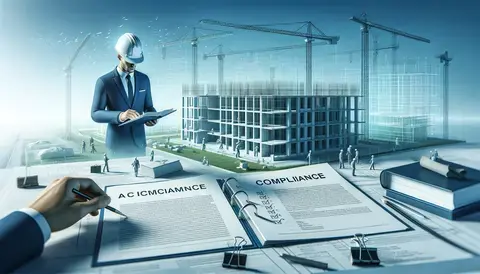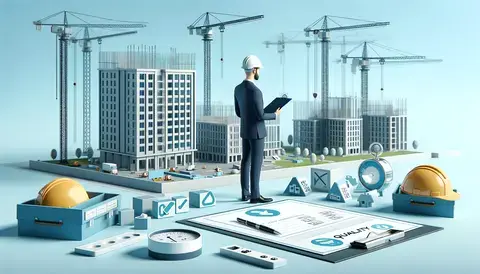Construction Management
Construction Management: Advanced Construction Management Techniques 2024

Introduction to Construction Management
Fun Fact: Did you know that the world's tallest building, the Burj Khalifa, utilized a whopping 330,000 cubic meters of concrete and 103,000 square meters of glass? This marvel of modern engineering not only showcases the advancements in construction technologies but also exemplifies the intricate coordination and management that define the field of construction management.
Definition of Construction Management: Construction Management is a professional service that uses specialized project management techniques to oversee the planning, design, and construction of a project, from its beginning to its end. The purpose of construction management is to control a project's time, cost, and quality—sometimes referred to as a project management triangle or "triple constraints."

Importance of Efficient Construction Management: Efficient construction management is crucial as it directly impacts the project’s overall cost, quality, and timely completion. Good management practices ensure that construction projects meet their deadlines, stay within budget, and adhere to building codes, quality standards, and safety specifications. These practices reduce potential risks and increase the likelihood of project success, contributing to greater economic stability and safety in the built environment.
The Role of Construction Managers: Construction managers play a pivotal role in orchestrating the construction process. They coordinate and manage people, materials, and equipment, ensure that construction projects follow blueprints and plans, and comply with legal requirements, building and safety codes. Moreover, construction managers are responsible for selecting, hiring, and overseeing contractors and workers; they solve disputes and keep all stakeholders informed throughout the life of the project. Their expertise ensures that projects start and finish on time, within budget, and to the standards of quality and safety required.
- Overview of Construction Management:
- Definition, scope, and importance in modern construction projects.
- Link to Article:
- An Introduction to Architecture and Building Construction: Explore foundational concepts that underpin construction management.
Module 1: Fundamentals of Construction Management

- Lesson 1: The Role of a Construction Manager
- Key responsibilities and daily tasks.
- Essential skills and attributes.
This lesson covers what a construction manager does on a day-to-day basis, including overseeing projects, managing resources, and guiding teams to success. We'll explore the skills and attributes needed for this role, such as leadership, problem-solving, and communication.
For more information, see the article: "Manager of Construction," which provides an in-depth look at what a construction manager does, and how to pursue this career path.
- Link to Article:
- Manager of Construction: Everything about the professional duties and career path of construction managers.
Module 2: Project Planning and Management

- Lesson 1: Construction Project Planning
- Techniques for effective project scheduling and resource allocation.
This lesson provides strategies for planning construction projects effectively, including techniques for scheduling and resource allocation. You'll learn how to map out a project's phases, allocate resources efficiently, and manage timelines.
For a more detailed look, read the article: "Building Construction Process," which provides a comprehensive walkthrough of each phase and critical step in construction projects.
- Link to Article:
- Building Construction Process: Detailed walkthrough of the phases and critical steps in the building construction process.
Module 3: Legal Aspects and Compliance
This module explores the legal aspects and compliance requirements in construction management. It covers key areas including health and safety regulations, environmental standards, and sustainable practices.

- Lesson 2: Compliance and Safety Regulations
- Health and safety standards.
- Environmental regulations and sustainable practices.
This lesson focuses on maintaining compliance and meeting safety standards in construction projects. You'll learn about health and safety regulations designed to protect workers and the public, and environmental guidelines that promote sustainable practices.
For more information, read the article: "Construction Project Management," which provides an overarching look at managing construction projects, with a focus on compliance and regulations.
- Link to Article:
- Construction Project Management: An overarching look at managing construction projects with a focus on compliance and regulations.
Module 4: Advanced Project Management Techniques
This module focuses on advanced project management techniques in construction, including modern technologies and effective leadership.

- Lesson 1: Modern Construction Technologies
- Adoption of new technologies like BIM and IoT in construction.
This lesson covers the adoption of new technologies in construction, such as Building Information Modeling (BIM) and the Internet of Things (IoT), to streamline project management and improve efficiency.
- Lesson 2: Leadership and Human Resource Management
- Developing leadership skills.
- Managing teams and dealing with labor relations.
This lesson delves into developing leadership skills, managing teams, and addressing labor relations, ensuring successful project execution.
For more information, read the articles:
- Link to Articles:
- Be Your Own General Contractor: Guidance for those managing their own construction projects.
- Link to Article:
- Construction Manager at Risk (CMAR): Focus on the CMAR delivery method, including risk mitigation and contract management.
Module 5: Quality Control and Assurance
This module emphasizes the importance of quality control and assurance in construction projects. It covers key areas such as standards, tools, and practices for maintaining quality throughout a project's lifecycle.

- Lesson 1: Quality Management in Construction
- Standards, tools, and practices for ensuring quality.
This lesson provides an overview of standards, tools, and practices that ensure quality in construction projects, helping to meet industry requirements and client expectations.
- Lesson 2: Performance Monitoring and Evaluation
- Techniques for assessing project performance and outcomes.
This lesson covers techniques for assessing project performance and outcomes, enabling project managers to track progress, identify issues, and make adjustments to ensure successful completion.
Module 6: Risk Management
This module covers risk management in construction projects, focusing on identifying, analyzing, and mitigating potential risks to ensure project success.

- Lesson 1: Identifying and Analyzing Risks
- Tools and methodologies for risk assessment.
This lesson provides an overview of tools and methodologies for risk assessment, helping project managers identify potential issues early and make informed decisions.
- Lesson 2: Mitigation and Management of Risks
- Strategies for risk reduction and management plans.
This lesson explores strategies for reducing risks and developing management plans, ensuring project stability and minimizing negative impacts.
Module 7: Sustainable Construction Practices
This module focuses on promoting sustainability in construction projects. It explores green building practices, sustainable technologies, and their implementation to reduce environmental impact and promote resource efficiency.

- Lesson 1: Green Building and Sustainable Technologies
- Overview of sustainable construction methods and materials.
This lesson provides an overview of sustainable construction methods and materials, emphasizing the importance of adopting environmentally friendly practices in construction projects.
- Lesson 2: Implementing Sustainability in Construction Projects
- Case studies on LEED-certified and green projects.
This lesson examines case studies of LEED-certified and green projects, showcasing successful implementations of sustainable practices in real-world construction projects.
Conclusion and Certification

- Review and Final Examination:
- Comprehensive test covering all modules.
- Course Completion and Certification:
- Awarding of certificates to successful participants.
Supplementary Materials
- Recommended Reading List:
Explore these books, articles, and research papers for advanced insights into construction management:
- "Construction Project Management" by Frederick Gould and Nancy Joyce
- "Modern Construction Management" by Frank Harris and Ronald McCaffer
- "Construction Management JumpStart: The Best First Step Toward a Career in Construction Management" by Barbara J. Jackson
- "Construction Management: Principles and Practice" by Chris March and Adrian J. Smith
- "Construction Project Management: A Complete Introduction" by Alison Dykstra
- "The Lean Construction Pocket Guide" by Lean Construction Institute
- "Building Information Modeling (BIM) in Construction Management" by Saurabh Kumar Rajvanshi
- "Construction Management for Industrial Projects" by Mohamed A. El-Reedy
- "Construction Operations Manual of Policies and Procedures" by Sidney M. Levy
- "The Manager's Guide to Building a Successful Project Team" by Michael L. George
These resources offer in-depth knowledge and practical insights to enhance your understanding of advanced construction management practices.
- Instructional Videos:
- Curated list of videos from industry experts and real-world construction management scenarios.
Get into the world of construction management with this curated list of videos featuring industry experts and real-world scenarios:
- "Effective Project Management in Construction" by Procore Technologies
- "Introduction to Lean Construction" by Lean Construction Institute
- "Construction Management Techniques and Strategies" by The Chartered Institute of Building (CIOB)
- "Virtual Design and Construction (VDC) in Practice" by Autodesk Construction Solutions
- "Advanced Scheduling Techniques for Construction Projects" by Project Management Institute (PMI)
- "Risk Management in Construction Projects" by Construction Industry Institute (CII)
- "Building Information Modeling (BIM) Implementation Case Studies" by BIM Institute
- "Effective Communication Strategies for Construction Managers" by Construction Management Association of America (CMAA)
- "Cost Estimating and Budget Management in Construction" by American Society of Professional Estimators (ASPE)
- "Construction Safety Best Practices and Incident Prevention" by Occupational Safety and Health Administration (OSHA)
These videos provide valuable insights, practical tips, and real-life examples to help you excel in construction management.
Construction Management FAQs
- Compilation of frequently asked questions to aid understanding.
Construction Management FAQs! Explore essential insights into the world of construction management, from project oversight to industry best practices. Answers to the most pressing questions and uncover the keys to successful project execution.
Lets address common questions about construction management to help deepen your understanding of this field. Whether you're new to construction management or looking to expand your knowledge, we've got you covered.
What is construction management?
Answer: Construction management involves overseeing all aspects of a construction project, from planning and budgeting to execution and completion. It ensures projects are completed on time, within budget, and according to specifications.
Construction management is like being the conductor of an orchestra, coordinating every aspect of a construction project to ensure harmony and success. It involves tasks such as:
- Planning: Creating schedules and timelines for project milestones.
- Budgeting: Estimating costs and allocating resources efficiently.
- Risk management: Identifying potential risks and developing strategies to mitigate them.
- Quality control: Ensuring that work meets standards and specifications.
For example, a construction manager might create a schedule outlining when each phase of a project should be completed and allocate funds accordingly. They would also monitor progress regularly to address any issues that arise and ensure the project stays on track.
What skills are required for a career in construction management?
Answer: A career in construction management requires a combination of technical, interpersonal, and organizational skills. These include communication, leadership, problem-solving, and attention to detail.
To succeed in construction management, you need a diverse set of skills, including:
- Communication: Clear communication is essential for coordinating with team members, clients, and subcontractors.
- Leadership: As a construction manager, you'll need to motivate and inspire your team to achieve project goals.
- Problem-solving: Construction projects often encounter unexpected challenges, so the ability to think quickly and find solutions is crucial.
- Attention to detail: From reviewing blueprints to inspecting workmanship, paying attention to detail ensures that projects meet quality standards.
- Technical knowledge: Understanding construction techniques, building codes, and safety regulations is essential for effective project management.
For instance, if a project falls behind schedule due to inclement weather, a construction manager might rearrange tasks or allocate additional resources to keep the project on track.
How can technology improve construction management practices?
Answer: Technology plays a significant role in enhancing construction management practices, offering tools for project planning, communication, and data analysis.
Technology offers several benefits for construction management, including:
- Project management software: Platforms like Primavera P6 or Procore help streamline project planning, scheduling, and communication by centralizing information and facilitating collaboration among team members.
- Building Information Modeling (BIM): BIM software allows construction managers to create detailed 3D models of projects, enabling better visualization, clash detection, and coordination among different trades.
- Drones: Drones can be used to survey construction sites, monitor progress, and identify potential safety hazards, improving overall project efficiency and safety.
For example, a construction manager might use project management software to create a detailed schedule, assign tasks to team members, and track progress in real-time, ensuring that everyone stays on the same page throughout the project.
What are the different project delivery methods in construction management?
Answer: In construction management, various project delivery methods dictate how projects are organized, designed, and constructed. The most common methods include:
- Design-Bid-Build (DBB): In this traditional method, the owner hires a designer separately from the contractor. The designer completes the project's design, which is then put out to bid. Once a contractor is selected, construction begins.
- Design-Build (DB): In this approach, the owner hires a single entity to handle both design and construction. This can streamline the process and reduce conflicts between the designer and contractor.
- Construction Management at Risk (CMAR): Under this method, the construction manager is involved from the project's early design stages and works with the owner and designer to manage costs, schedules, and quality. The construction manager provides input during design and guarantees a maximum price for construction.
- Integrated Project Delivery (IPD): IPD involves collaboration among all project stakeholders, including the owner, architect, contractor, and subcontractors. All parties work together from the project's inception to optimize project results.
Each project delivery method has its advantages and disadvantages, and the choice depends on factors such as project complexity, budget, and timeline.
What are common challenges faced by construction managers, and how can they be overcome?
Answer: Construction managers often face challenges such as:
- Schedule delays: Delays can occur due to inclement weather, material shortages, or unexpected site conditions. To mitigate delays, construction managers can develop contingency plans, closely monitor progress, and communicate effectively with stakeholders.
- Budget overruns: Cost overruns can result from inaccurate estimates, change orders, or unforeseen expenses. To manage budgets effectively, construction managers should conduct thorough cost analyses, negotiate contracts wisely, and track expenses meticulously.
- Safety hazards: Construction sites pose various safety risks, including falls, electrical hazards, and heavy machinery accidents. Construction managers can promote a culture of safety by implementing strict safety protocols, providing proper training to workers, and conducting regular inspections.
- Communication breakdowns: Miscommunication among project stakeholders can lead to misunderstandings, delays, and conflicts. Construction managers should prioritize clear and open communication, establish regular meetings, and use technology to facilitate collaboration.
- Quality control: Ensuring that work meets quality standards can be challenging, especially when dealing with multiple subcontractors and trades. Construction managers should implement quality control measures, conduct regular inspections, and address any deficiencies promptly.
By proactively addressing these challenges, construction managers can minimize disruptions and ensure the successful completion of construction projects.
In this section, we've explored some common questions about construction management, covering topics such as its definition, required skills, and the role of technology. By understanding these fundamentals, you'll be better equipped to navigate the complexities of construction projects and excel in your career as a construction manager. If you have any further questions, don't hesitate to reach out to us for assistance.
For detailed questions and answers about everything related to construction management, refer to this dedicated section: Construction Management FAQs
This outline provided a detailed roadmap for a comprehensive construction management course that covers essential knowledge areas, integrates relevant articles, and includes practical resources for an enriched learning experience.
At the end of this comprehensive construction management course, you'll have gained a thorough understanding of essential topics like project planning, scheduling, budgeting, risk management, and quality control. Through a blend of theoretical learning and practical applications, you'll have developed the skills and confidence needed to navigate the complexities of construction projects with proficiency. With hands-on experiences, including simulation exercises, workshops, and insights from industry experts, you'll be well-equipped to tackle the challenges of modern construction management. Whether you're a seasoned professional seeking career advancement or an aspiring newcomer, this transformative learning experience empowers you to excel in the fast-paced world of construction management.
